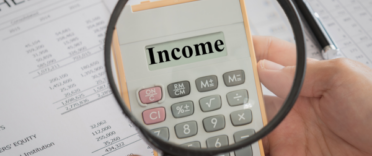
It’s time to address these perceptions, challenge the most common myths about income protection and find out if there is any truth in them, or whether these perceptions are in fact misconceptions!
1. If you have sick pay through work, you don’t need income protection
If you know with certainty that you would receive enough sick pay from your employer to live on indefinitely, it’s certainly true that you wouldn’t need income protection. This, however, is rarely a reality!
Many of us have some sick pay through our employers, but have you ever checked exactly how much you’re entitled to, and for how long? It’s true that everyone is entitled to Statutory Sick Pay, providing £96.35 per week for up to 28 weeks, but do you receive anything in addition to this? If you do, this might only be for a few days, weeks or months and typically employee sickness is treated on a discretionary basis and may be affected by whether you are likely to return to work so it’s not certain exactly what financial support you would receive if you become unable to work due to illness or injury.
We never plan to be ill, and we don’t know for how long we will be unable to work, so what if you were ill beyond your company's sick pay period? Or even the 28 weeks Statutory Sick Pay period? How would you continue to cover your outgoings? And even then, could you survive on only £96.35 per week in the worst-case scenario?
If you’re unable to answer any of these questions, you may need income protection. Sick pay is just one consideration though, we’ve written a useful article to help you work out if you need income protection, looking at everything from your savings to government benefits. Take a read here - Income Protection - do you really need It?
2. If you have critical illness insurance, you don’t need income protection
Critical illness insurance is a product that pays out a lump sum amount of money should you fall ill with a specific illness amongst a list of illnesses that are defined in your policy terms and acts as a safety net. This cash lump sum can be used as you wish and could be used to replace your regular income if your illness means that you can't work. There are scenarios where an illness could receive the same financial support from both a critical illness policy and an income protection policy, in which case having just one type of policy would suffice.
There are however a number of differences between the two products, which mean that income protection can go that little bit further in offering a financial helping hand should illness strike:
Cash lump sum vs a regular income
Critical illness insurance pays a one-off lump sum, when it’s gone it’s gone! Income protection insurance pays a regular income while you’re ill and unable to work, either until you make a recovery or your policy ends. As appealing as a lump sum of money is, income protection can offer long-term financial protection that critical illness may not be able to.
One-off payment vs. ongoing income
Once a critical illness policy has fully paid out, the policy comes to an end. It may even prove difficult to take out another policy after you’ve claimed. Income protection insurance however offers continuous protection, you can claim multiple times, even for the same illness.
Defined illness vs. any illness/accident
Critical illness policies typically cover around 50 conditions which they will pay out for. This means that unless you develop one of these specific conditions and meet the definition of the illness, you won’t be able to claim. Income protection on the other hand covers the inability to work, regardless of what illness or accident has caused that inability. According to the Office for National Statistics, musculoskeletal problems, such as back pain, were among the top causes of sickness absence from work, with mental health issues, such as stress, not far behind - illnesses that have a tendency to recur too. Why is this important? Well, it’s highly unlikely that critical illness cover would pay out for a back problem or stress, where income protection insurance may do.
3. Income protection will never pay out
This is definitely false! In fact, income protection is more likely than both life insurance and critical illness insurance to pay out. The reason for this is that it’s easier to claim against income protection insurance than the other products. You just have to be unable to work, rather than dying or developing a specified illness.
For example, according to LV’s Risk Reality Calculator, a 40-year-old female has only a 6% chance of death before age 70, however, she faces a 44% chance of falling ill and being unable to work for more than 2 months during the same period. In this scenario, her income protection policy is potentially over 7 times more likely to pay out than her life insurance policy.
4. Income protection is very expensive
Perceived cost puts many consumers off taking out income protection policies. But is income protection insurance as expensive as everyone thinks?
Let’s take that same 40-year-old female, for £100,000 of life insurance to age 70, she would pay roughly £10 per month. For £100,000 of critical illness insurance to age 70, she would pay roughly £70 per month.
However, for £1,500 of income protection insurance to age 70, she would pay only £41 per month. The policy we looked at would pay out after 3 months (a period of time that we suggest everyone should have an emergency fund for) and could potentially carry on paying the £1,500 until she was 70 if she never recovered enough to return to work and that could amount to over £500,000.
Perhaps income protection cover is not as expensive as you first thought?
Of course, there are factors that could increase the income protection premium, such as her occupation, we’ve assumed a low-risk job in the above example. The higher the risk that the job presents, the more expensive the income protection premium will be.
If you'd like the peace of mind that your income would continue if you were signed off work and lost your income, you should speak to an income protection specialist* who will be able to tailor the income protection insurance to what you need and what you want to spend - there are plenty of budget options available that provide good value for money.
5. If you have a health problem or are self-employed you can’t take out income protection
When you apply for an income protection policy there are typically two types of underwriting that take place. Underwriting is the process where the insurance company assesses your risk and therefore is able to calculate the correct premium to charge you for your insurance. If you've had extensive time off work due to ill health in the past or if your job relies, greatly on your physical fitness, you may be offered income protection with some limitations or without limitations but an increased monthly premium to cover the higher risk they assume.
Medical underwriting
Medical underwriting involves questions about your health and allows the insurer to assess how healthy you are and your chances of illness. If you’ve had a health problem in the past the insurer may either increase your premium to reflect your increased risk, exclude any claims related to that previous health condition, or they may not offer you cover if they feel that your risk of a claim is too great.
Financial underwriting
Financial underwriting involves questions around your financial situation, allowing the insurer to correctly calculate the level of benefit you will receive if you claim. The financial evidence you need to provide will differ depending on your employment status. For example, if you’re employed you may be asked to provide a number of recent payslips and some insurers will make allowances if your income reduced due to some sporadic time off work before you became completely unable to work. If you’re self-employed you may be asked for self-assessments and accounts to prove your income. However, you can find income protection policies that will offer a guaranteed income payment of £1,500 if you claim to give you extra reassurance that your benefit will pay at least this if you're insured for more.
It’s worth bearing in mind though that not all insurers treat past medical conditions the same, and likewise, may not all ask for the same financial information. So being self-employed, or having a health condition, doesn’t necessarily mean you can’t take out income protection insurance, it’s just a case of finding the best insurer for you.
Comparing income protection insurance options
There are lots of different income protection products available and various things to consider when choosing the right policy. We would therefore highly recommend that you speak to an independent insurance adviser* who will be able to assess your needs and recommend the best income protection product for you based your personal circumstances and what you wish to spend.
As a Money to the Masses reader, you can get up to £100 cashback if you decide to buy the policy this way.
If a link has an * beside it this means that it is an affiliated link. If you go via the link, Money to the Masses may receive a small fee which helps keep Money to the Masses free to use. This link can be used if you do not wish to help Money to the Masses and do not wish to qualify for the cashback referred to in the article - LifeSearch






